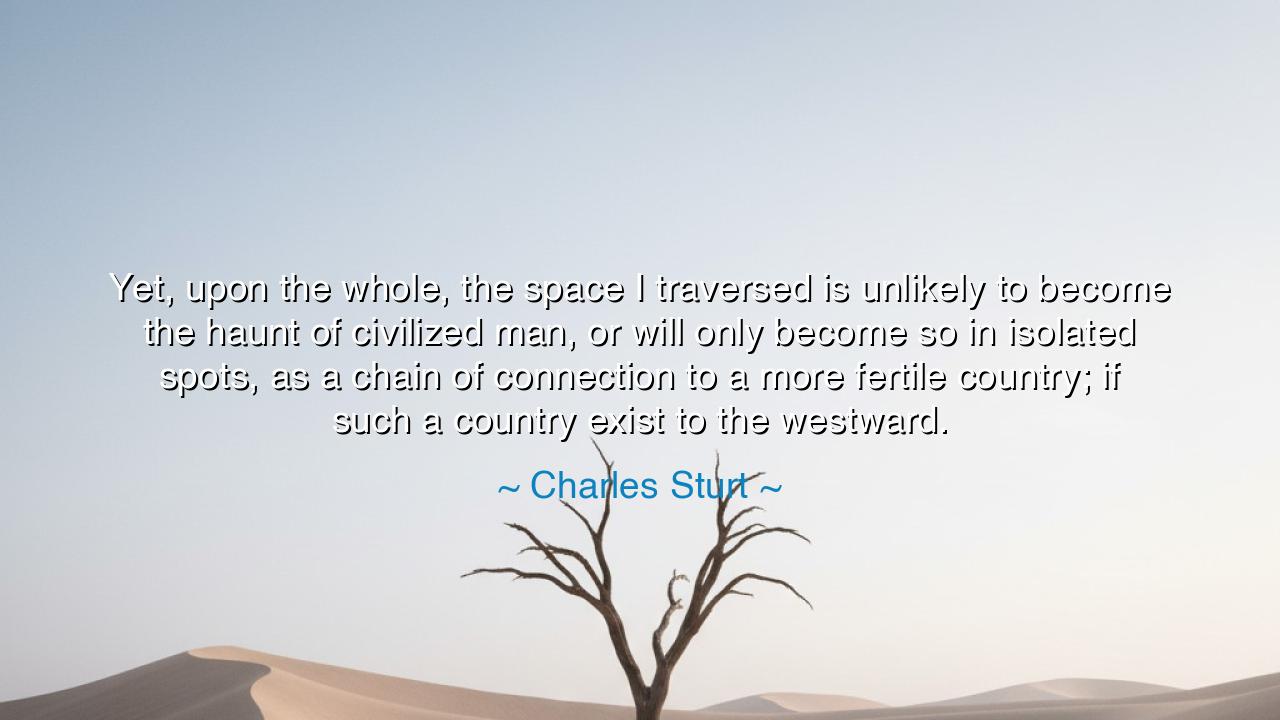
Yet, upon the whole, the space I traversed is unlikely to become
Yet, upon the whole, the space I traversed is unlikely to become the haunt of civilized man, or will only become so in isolated spots, as a chain of connection to a more fertile country; if such a country exist to the westward.






Hear the voice of Charles Sturt, the explorer who braved the barren heart of Australia, who left behind these solemn words: “Yet, upon the whole, the space I traversed is unlikely to become the haunt of civilized man, or will only become so in isolated spots, as a chain of connection to a more fertile country; if such a country exist to the westward.” This is not merely the observation of a traveler, but the lament of one who sought abundance and found desolation, who journeyed with hope of green pastures and discovered instead the vast dominion of stone, sand, and silence. His words speak to the eternal tension between human ambition and the stern realities of the earth.
The origin of this quote lies in Sturt’s great expeditions of the 19th century, when he and his companions pressed into the Australian interior in search of rivers, fertile plains, and the promise of settlement. Instead, they found stretches of desert, salt lakes, and searing heat. The land resisted them, not with armies but with emptiness. His conclusion—that the space he traversed was unlikely to welcome the dwellings of civilized man—reflects both the harshness of the land and the limits of European imagination at the time. What seemed barren to the colonist was, in truth, a land already inhabited, sustained for millennia by Aboriginal peoples who knew its secrets and rhythms.
Here lies a great lesson: what one man calls wasteland may be another man’s home. The ancients remind us that the desert holds wisdom, though it seems empty to the stranger. Did not Moses wander the wilderness and find revelation? Did not the Bedouin thrive upon sands that empires dismissed as void? Sturt’s despair, though sincere, shows us how vision can be clouded by expectation. He sought rivers like the Thames or the Rhine; he found instead a landscape that demanded humility, patience, and knowledge alien to his world.
History gives us another example in the settling of the American West. Explorers once called the Great Plains “the Great American Desert,” barren and unfit for habitation. Yet in time, through adaptation, resilience, and the guidance of those who already knew the land, it became home to millions. What was once deemed impossible became possible through perseverance. Thus, Sturt’s words, while heavy, remind us that human judgment is not final; what seems unlivable may, in time, reveal hidden sustenance.
The emotional weight of the quote, however, must not be overlooked. Sturt speaks not with arrogance, but with weariness. He had given much to the land—his strength, his hope, even his health—and in return, the land had given little comfort. In this, we see the eternal struggle of humankind against nature: the longing to conquer, the resistance of the earth, and the eventual recognition of limits. His words ring with the humility of one who has met a power greater than himself.
From this, let the teaching be clear: not all spaces will yield easily to our desires, and not all journeys lead to fertile soil. Yet in every journey lies a lesson, and in every barren plain lies wisdom for those who endure. To call a land unfit may be to confess not the weakness of the land, but the limits of one’s own understanding. Thus, humility must walk beside exploration, and respect must temper ambition.
And so, what shall we do with Sturt’s wisdom? When we face barren spaces in our own lives—dreams that seem fruitless, labors that bear no harvest—we must remember that even deserts teach. Do not scorn the difficult places; instead, learn their lessons, adapt, and seek the hidden springs that lie beneath the surface. And when you encounter what seems uninhabitable, remember that others may yet know its secrets. Seek their wisdom, as Sturt did not, and you may find that the wilderness you feared becomes the very place where your soul grows strong.






AAdministratorAdministrator
Welcome, honored guests. Please leave a comment, we will respond soon